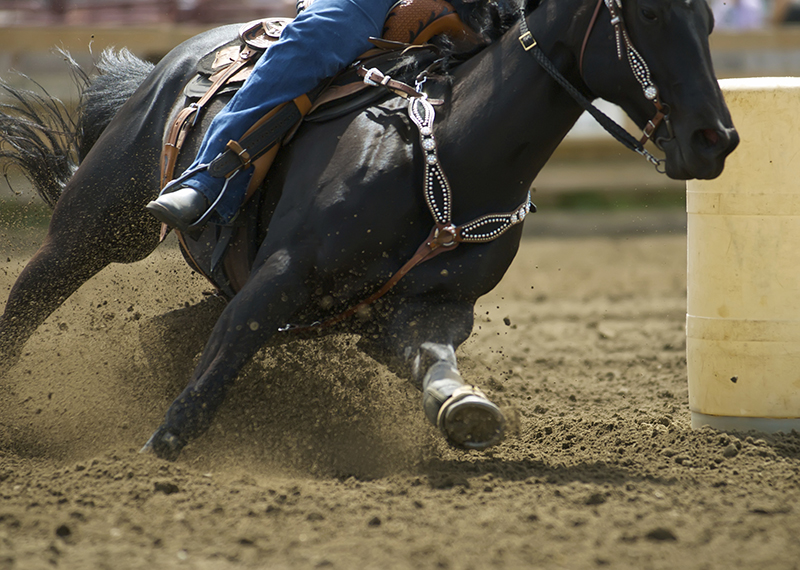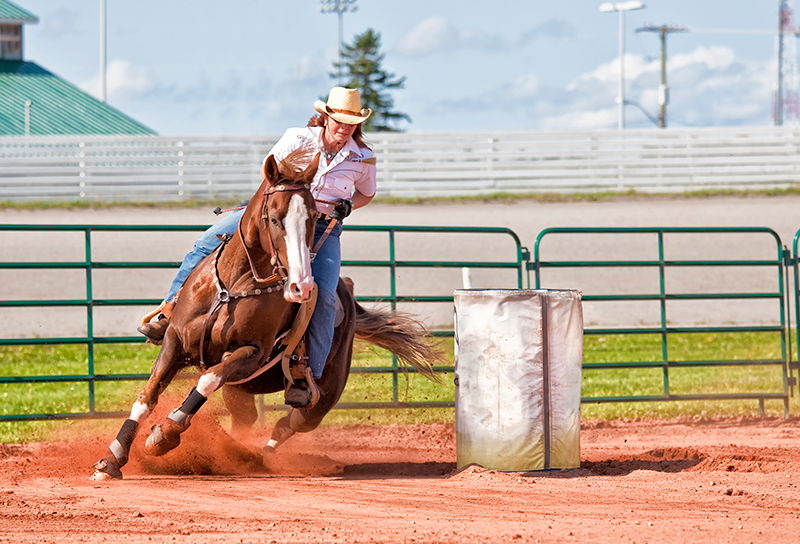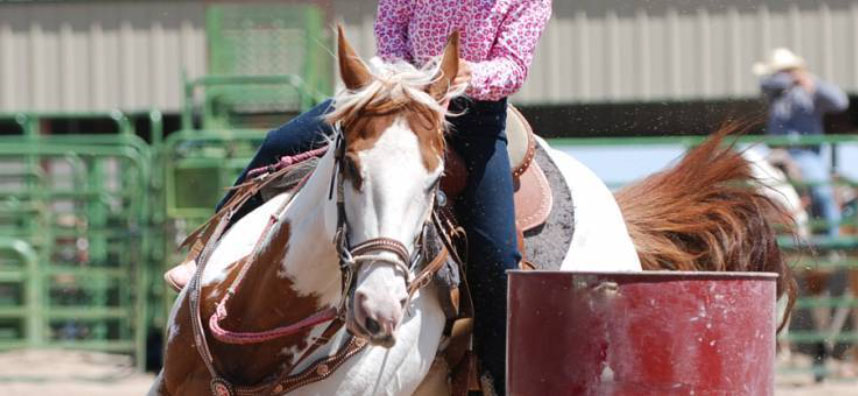
Barrel racing is an equestrian sport in which a horse and rider attempt to run a cloverleaf pattern around preset barrels in the fastest time. It is a timed event, and the goal is to complete the pattern as quickly as possible without knocking over any barrels. Barrel racing is typically a women's event, but both sexes compete at amateur and youth levels.
The most common breed of horse used in barrel racing is the American Quarter Horse. Quarter Horses are known for their speed, agility, and willingness to work, all of which are essential qualities for a barrel horse. Other breeds that are sometimes used in barrel racing include Paint Horses, Appaloosas, and Thoroughbreds.
The ideal barrel horse is a horse that is quick, agile, and responsive to the rider's cues. The horse should also be calm and focused, as it is important to stay focused on the pattern and not get distracted by the crowd or other horses.
Barrel racing is a challenging but rewarding sport that requires both the horse and rider to be in peak condition. With the right horse and the right training, barrel racers can compete at the highest levels of the sport.
Here are some of the qualities that make a good barrel horse:
- Speed: Barrel horses need to be able to run quickly and smoothly around the barrels.
- Agility: Barrel horses need to be able to make tight turns around the barrels without knocking them over.
- Responsiveness: Barrel horses need to be responsive to the rider's cues, so that they can run the pattern as quickly and accurately as possible.
- Calmness: Barrel horses need to be calm and focused, so that they can stay focused on the pattern and not get distracted by the crowd or other horses.
If you are interested in getting involved in barrel racing, there are a few things you can do to get started:
- Find a good barrel horse. You can do this by talking to other barrel racers, attending horse shows, or looking for horses online.
- Get some training. There are many different barrel racing trainers available, so you can find one who is a good fit for you and your horse.
- Practice regularly. The more you practice, the better you and your horse will become at barrel racing.
With hard work and dedication, you can become a successful barrel racer.
Barrel Racing - Camps
Barrel Racing - Clubs and Associations
- Barrel Buddies, Salt Lake County Equestrian Center, 2100 West 11400 South, South Jordan, UT 84095
- Better Barrel Races, LLC, P.O, Box 720900, Norman, OK 73070
- Billings Barrel Racing Series (BBRS) 2649 Ranchette Road, Billings, MT 59105
- Bluebonnet Barrel Racing Association, Lytle, TX 78052
- Central 4D Barrel Racers. Oklahoma Region, 5650 N Broadway, Norman, OK 73069
- Clark County Saddle Club, 10505 NE 117th Ave., Vancouver, WA 98662
- Gulf Coast Barrel Racing Association (GCBRA), 2315 Jack Beaver Road, Santa Fe, TX 77517
- International Barrel Racing Association (IBRA), P.O. Box 91205, Louisville, KY 40291
- Michigan Barrel Racing Association (MBRA), 12276 E. Dodge Road, Otisville, MI 48463
- Michigan National Barrel Horse Association (MNBHA), 1950 64th Street, Byron Center, MI 49315
- National Barrel Horse Association (NBHA)
- NBHA Idaho Barrel Racing, 3386 E. Country Lane, Kuna, ID 83634
- NBHA TX 15, 1650 N Hwy 69, Denison, TX 75021
- Nebraska 4-D, 44080 Dr. 796, Broken Bow, NE 68822
- Nebraska State National Barrel Horse Association NE
- Oregon Barrel Racing Association (OBRA), 228 NW 12 th St., Corvallis, OR 97330
- Outback Barrel Racing Association, P.O. Box 145, Wolf Point, MT 59201
- Paint Barrel Racing Incentive Program, 2800 Meacham Blvd, Fort Worth, Texas 76137
- Penn-Ohio Barrel Racing Association, 184 Cochran Road, Fredonia, Pa 16124
- Racing in the Rockies, P.O. Box 2055, Eagle, CO 81631
- Southeast Texas Barrel Racing Association (STBRA), TX
- Southwest Barrel Racing Association (SBRA), 10378 107 Road, Dodge City, KS 67801
- Utah Barrel Racing Association (UBRA), UT
- Valley Girls Barrel Racing Association (VGBRA), 2361 Lyons Ferry Road, Prescott, WA 99348
- Washington County Barrel Racing Association (WCBRA), UT
- West Coast Barrel Racing, 6055 Central Ave., Ceres, CA 95307
- Wisconsin Girls Barrel Racing Association (WGBRA), S380 State Road 37, Mondovi, WI 54755
Barrel Racing - Education
Barrel Racing - Event Organizers
- Barrel Racers National 4D (BRN4D), 13159 South Leland Road, Oregon City, OR 97045
- Best of Barrels Only
- PacWest Barrel Racing, P.O. Box 1167, Norman, OK 73070
- South Buckeye Equestrian Center, 10300 S. Miller Road, Buckeye, AZ 85326
- U Barrel Racing Championships, 1 Dogwood Drive, Park City, MT 59063
Barrel Racing - Futurities
- Barrel Futurities of America, Inc., Rt. 2, Box 120 K, Vian, OK 74962
- Canadian Barrel Futurities CAN
- Fizz Bomb Classic - Barrel Futurity, RCM Productions, P.O. Box 2698, Gillette, WY 82717
Barrel Racing - News
- Barrel Horse News, 2112 Montgomery Street, Fort Worth, TX 76107
- Barrel Racing Report, 777 HCR 3320, Hubbard, TX 76648
- BarrelHorseWorld.com, 1939 NE Lakeshore Dr., Lee's Summit, MO 64086
- ebarrelracing.com
- RFD-TV
Barrel Racing - Software
Barrel Racing - Tack
Barrel Racing - Training and Sales
- Gold Standard Barrel Horses, Double Jack Ranch, Cedar City, UT 84720
- Jodi Scott's School of Horsemanship, 5717 E. Redbird Road, Scottsdale, AZ 85266
- Josey Enterprises, Inc., 8623 SH 43 N, Karnack, TX 75661
- LM Barrel Racing, 14012 CR 472, Lindale, TX 75771
- Lone Tree Ranch, LLC, 1120 Spur 100, Kerrville, TX 78028
- Merle Morgan Ranch, 5810 S 35 W, Idaho Falls, ID 83402
- MR Performance Horses, 13950 SW 41st Place, Ocala, FL 34481
- Performance Horse Stallions
- Sharon Camarillo, CA
- Slash W Barrel Horses, 312 Private Road 1184, Dublin, TX 76446
- Triangle Cross Barrel Horses, Norton, KS 67654
- Valentine Farm, 254 Ashley Lynn Lane, Dunn, NC 28334
- Youree Ranch, Box 77, Addington, OK 73520

Upper Airway Obstruction in Barrel Racing Horses

By Kentucky Equine Research Staff
Competitive horses often present to veterinarians with concerns about upper respiratory noise and poor performance. Researchers determined the prevalence of upper airway obstruction by retroactively reviewing medical records of barrel racing horses subjected to overground endoscopy. Upper airway obstruction was common, and over half of those horses were diagnosed with multiple causes of obstruction.
Upper airway obstructions involve structures located in the region of the soft palate and larynx at the back of the throat and include conditions such as:
- Pharyngeal lymphoid hyperplasia;
- Nasopharyngeal collapse;
- Palatal instability;
- Intermittent dorsal displacement of the soft palate;
- Medial deviation of the aryepiglottic fold;
- Recurrent laryngeal neuropathy;
- Vocal fold collapse;
- Ventromedial luxation of the apex of the corniculate process of the arytenoid; and
- Cricotracheal ligament collapse.
“Any of these conditions can have detrimental effects on ventilation and gas exchange, resulting in poor performance,” said Catherine Whitehouse, M.S., of Kentucky Equine Research.
Barrel racing is an anaerobic event that involves sprinting through a cloverleaf pattern at high speed, typically in less than twenty seconds. According to veterinary experts, barrel racing horses are frequently referred for airway evaluations with complaints of roaring and gurgling.*
To improve their understanding of upper airway abnormalities in barrel racing horses, the researchers reviewed the videos obtained during overground endoscopy. This procedure is performed by placing a portable endoscope into the airways of horses and then evaluating the upper airway structures during rest and exercise. In total, 164 Quarter Horses involved in barrel racing underwent overground endoscopy.
No abnormalities were identified in 15% of the evaluated horses during exercise, which means most of the horses were diagnosed with upper airway obstruction. Over half of the horses with abnormalities (56%) had more than one upper airway obstruction, with a total of 279 observed obstructions during exercise. In the 140 horses with upper airway obstructions, the most common abnormalities were nasopharyngeal collapse (49%), pharyngeal instability (42%), and intermittent dorsal displacement of the soft palate (39%). This means that abnormalities of the soft palate and pharyngeal walls occurred more commonly than those involving the larynx.
While airway obstructions are traditionally believed to occur at high speed, the upper airway obstructions noted in this review showed that 55% occurred at low-speed, low-intensity work rather than during the high-speed, high-intensity portion of the exam (only 22%). Specifically, intermittent dorsal displacement of the soft palate was 19 times more prevalent during low-speed exercise. Some horses experienced upper airway obstruction during both low- and high-speed exercise.
“The researchers noted that finding more upper airway obstructions during low-speed, low-intensity exercise was unexpected. They suggested that dynamic upper airway obstructions are not simply due to extreme airway pressures experienced during high-speed exercise or muscle weakness. They proposed it could instead be due to muscular tension or increased contraction of the upper airway secondary to situational stressors or an anticipatory effect of exercise,” explained Whitehouse.
When abnormalities were observed during high-speed exercise, it was primarily during the final straight-line sprint to the finish rather than when turning around the barrels.
“The final sprint is when airway pressure changes are likely the greatest. Also, airway muscle fatigue may be a contributing factor at this point in the competition,” Whitehouse added.
Finding a high prevalence of dorsal displacement of the soft palate brings to light a recent study suggesting that upper airway abnormalities could be a result of asthma. That study suggested looking for evidence of equine asthma rather than focusing on the soft palate exclusively when faced with horses presenting for upper respiratory noise or poor performance.**
For equine asthma, allergen avoidance and using medications such as bronchodilators and corticosteroid anti-inflammatory drugs in conjunction with high-quality marine-derived omega-3 supplement are the treatments of choice based on the most recent guidelines.***
“EO-3 and other antioxidant products developed by Kentucky Equine Research are recommended for horses exhibiting poor performance. Providing these nutrients can help reduce the negative impact of oxidative stress created by intense exercise and demanding competition schedules. Consider adding EO-3, Nano-E, and Nano-Q10 to your feeding program to support health and performance,” Whitehouse recommended.
Reprinted courtesy of Kentucky Equine Research. Kentucky Equine Research is an international equine nutrition, research, and consultation company serving horse owners and the feed industry. Our goals are to advance the industry's knowledge of equine nutrition and exercise physiology, apply that knowledge to produce healthier, more athletic horses, and support the nutritional care of all horses throughout their lives. Learn more at KER.com.
There a more informative articles in our section on Health & Education.
*Massie, S.L., and R. Léguillette. 2023. Upper airway endoscopy in exercising horses: Findings in 164 barrel racing horses with respiratory clinical signs and/or poor performance. Veterinary Journal 300-302:106038.
**Joó, K., Á. Povázsai, Z. Nyerges-Bohák, O. Szenci, and O. Kutasi. 2021. Asthmatic disease as an underlying cause of dorsal displacement of the soft palate in horses. Journal of Equine Veterinary Science 96:103308.
***Couëtil, L.L., J.M. Cardwell, V. Gerber, J.-P. Lavoie, R. Leguillette, and E.A. Richard. 2016. Inflammatory airway disease of horses—Revised consensus statement. Journal of Veterinary Internal Medicine 30(2):503-515.






























